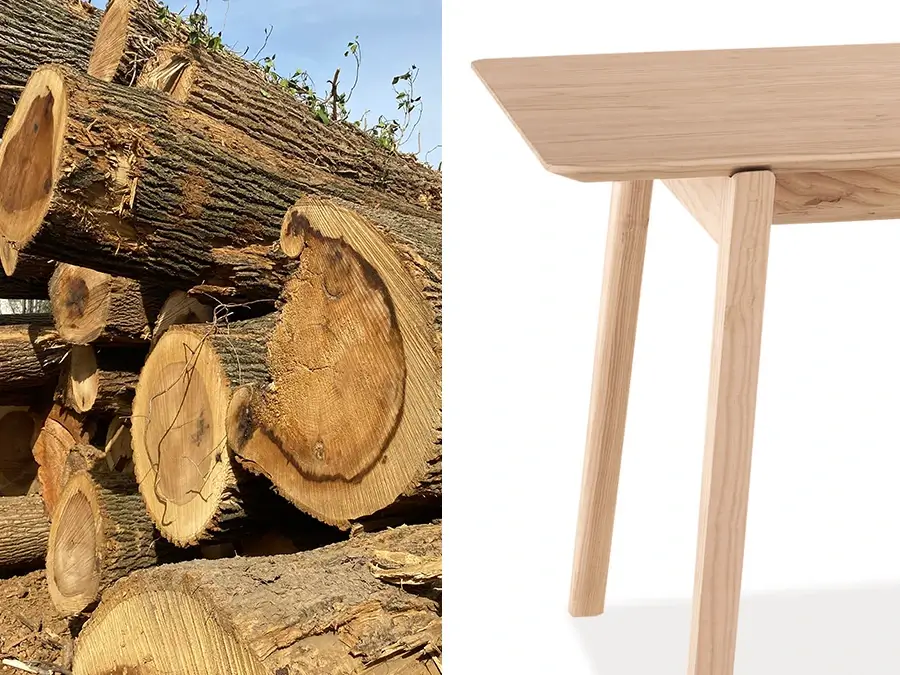The Emerald Ash Borer (EAB) is a voracious beetle that is wreaking havoc on trees in forests, cities and towns across America. The invasive beetle prefers ash trees and in cities like Minneapolis where 1 in 5 trees in the city’s tree canopy were ash species, the swath of carnage left thousands of dead or decaying ash trees that had to come down. However, entrepreneurs, tree lovers, artisans, and forward-thinking companies were able to give these ash trees second lives. Among them was the U.S. based furniture company Room & Board. They recognized the on-going value of these trees and worked with partners to divert these ash trees (and other fallen urban and community trees) into products that celebrate the beauty of the wood, capture carbon (for decades or even centuries) and work towards regenerative circular economies in their own city.
The Orlin table is one example of Room & Board’s Urban Wood Project Minneapolis, which is sourced from partner organization Wood From the Hood/Siewert Cabinet. Paying homage to Minnesota’s Scandinavian history, it features sleek, soft curves, simple joinery, and beautifully lacquered ash wood, saved from removed trees. These ash trees are removed from the waste stream, milled into quality lumber, and transformed into beautiful furniture—all by Minneapolis organizations and artisans. Room & Board connects these smaller, localized wood shops and craftsmen to a larger source of consumers, working as a retailer to sell sustainable products from cities across the country.
But Minneapolis’ ash trees aren’t the only victims of a shortened lifespan. The USDA Forest Service estimates the loss of 36 million trees in both urban and suburban areas per year, equivalent to $96 million lost in ecosystem benefits. Despite this large volume of source material and an increasing demand for environmentally-conscious products, most companies are unable to efficiently utilize reclaimed urban wood due to a fragmented supply chain as well as a need to build awareness and demand for urban wood.
“In a perfect world, our vendor partners can simply reach out to their supplier and order urban wood just like they would order virgin wood,” explains Room & Board’s Director of Sustainability Emily McGarvey. “But it’s a supply chain that’s never been built before, it’s almost like we’re building a highway. Some cities may still have a dirt road and other cities have more of a paved highway where things work more smoothly. We’re just trying to be patient as all of the highways are built for this new supply chain in different cities.”
Helping to build these “highways” is nonprofit organization Urban Wood Economy, Inc (UWE). Originally focusing on reclaimed materials from deconstructing abandoned buildings, UWE is now working to utilize large-scale trees coming down in urban communities. Through aggregation and processing sites (also called tree recycling campuses), UWE and partners can transform entire trees into dimensional lumber, biochar, and compost—creating a zero-waste facility. Wrestling with different parts of the same wood supply chain, both Room & Board and Urban Wood Economy are deeply invested in diverting millions of tons of wood from landfills and capturing carbon on a scale that has never been attempted before.
“Our organization is shattering the ceiling on reclaiming urban wood, and Room & Board is working with us to break the code on large scale wood utilization,” says Urban Wood Economy’s Director of Partnership and Outreach Jennifer Judd.
How did a national retailer based in Minneapolis enter the wood utilization space? From starting small-scale with reclaimed Baltimore wood, Room & Board has been leading the way in the urban wood utilization market and sustainability initiatives since late 2016. Now, the company works with local wood mills, shops, and deconstruction organizations anywhere from New York to California, recently achieving B-corp certification in 2023. This rigorous accolade is awarded to for-profit corporations that meet exacting and high standards of both social and environmental performance, public transparency, and legal accountability. As the company continues to grow, they are constantly looking for new ways to continue improving their environmental and social impact.
“We have a public-facing goal to divert a thousand trees annually by 2025. The key to that is involving more cities, sourcing more dimensional lumber, and creating higher-volume products,” Emily McGarvey says.
The Orlin line is just one step toward diverting more trees and creating change through products. Together, Urban Wood Economy, community partners, and national partners like Room & Board are working to fill in the supply chain gaps and connect quality urban lumber to manufacturers. While cabinets crafted with deconstructed Baltimore row houses and felled Detroit tree salad bowls make a beautiful, sustainable statement, Room & Board hopes their reclaimed urban wood products will become the norm rather than a conversation piece.
By Mara Lind

